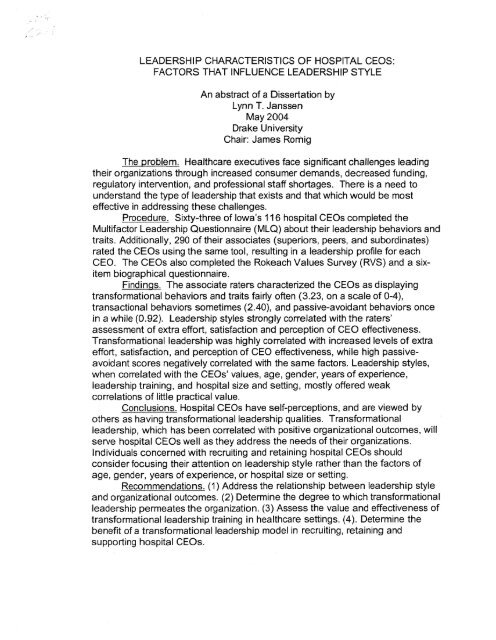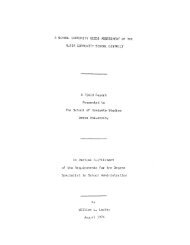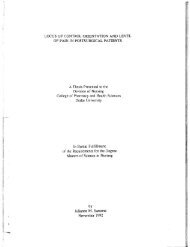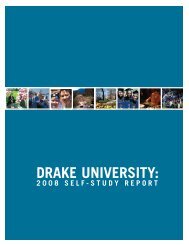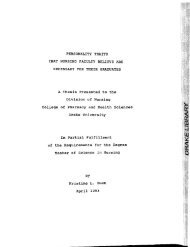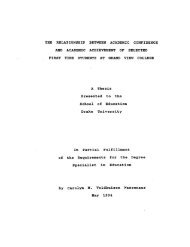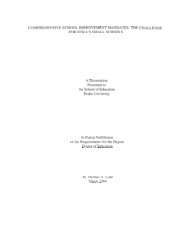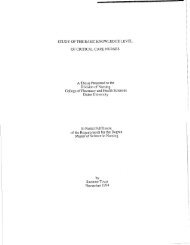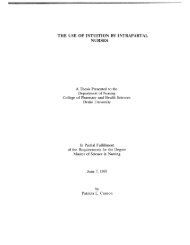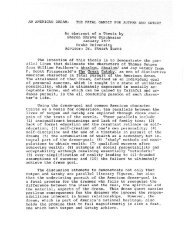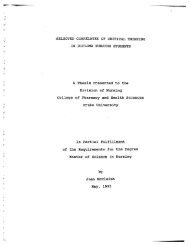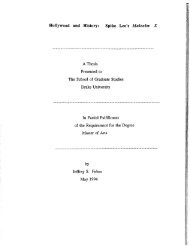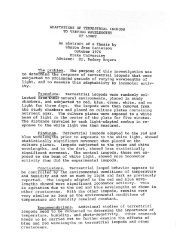LEADERSHIP CHARACTERISTICS OF ... - Drake University
LEADERSHIP CHARACTERISTICS OF ... - Drake University
LEADERSHIP CHARACTERISTICS OF ... - Drake University
You also want an ePaper? Increase the reach of your titles
YUMPU automatically turns print PDFs into web optimized ePapers that Google loves.
<strong>LEADERSHIP</strong> <strong>CHARACTERISTICS</strong> <strong>OF</strong> HOSPITAL CEOS:<br />
FACTORS THAT INFLUENCE <strong>LEADERSHIP</strong> STYLE<br />
An abstract of a Dissertation by<br />
Lynn T. Janssen<br />
May 2004<br />
<strong>Drake</strong> <strong>University</strong><br />
Chair: James Romig<br />
The problem. Healthcare executives face significant challenges leading<br />
their organizations through increased consumer demands, decreased funding,<br />
regulatory intervention, and professional staff shortages. There is a need to<br />
understand the type of leadership that exists and that which would be most<br />
effective in addressing these challenges.<br />
Procedure. Sixty-three of Iowa's 11 6 hospital CEOs completed the<br />
Multifactor Leadership Questionnaire (MLQ) about their leadership behaviors and<br />
traits. Additionally, 290 of their associates (superiors, peers, and subordinates)<br />
rated the CEOs using the same tool, resulting in a leadership profile for each<br />
CEO. The CEOs also completed the Rokeach Values Survey (RVS) and a six-<br />
item biographical questionnaire.<br />
Findinas. The associate raters characterized the CEOs as displaying<br />
transformational behaviors and traits fairly often (3.23, on a scale of 0-4),<br />
transactional behaviors sometimes (2.40), and passive-avoidant behaviors once<br />
in a while (0.92). Leadership styles strongly correlated with the raters'<br />
assessment of extra effort, satisfaction and perception of CEO effectiveness.<br />
Transformational leadership was highly correlated with increased levels of extra<br />
effort, satisfaction, and perception of CEO effectiveness, while high passive-<br />
avoidant scores negatively correlated with the same factors. Leadership styles,<br />
when correlated with the CEOs' values, age, gender, years of experience,<br />
leadership training, and hospital size and setting, mostly offered weak<br />
correlations of little practical value.<br />
Conclusions. Hospital CEOs have self-perceptions, and are viewed by<br />
others as having transformational leadership qualities. Transformational<br />
leadership, which has been correlated with positive organizational outcomes, will<br />
serve hospital CEOs well as they address the needs of their organizations.<br />
Individuals concerned with recruiting and retaining hospital CEOs should<br />
consider focusing their attention on leadership style rather than the factors of<br />
age, gender, years of experience, or hospital size or setting.<br />
Recommendations. (1 ) Address the relationship between leadership style<br />
and organizational outcomes. (2) Determine the degree to which transformational<br />
leadership permeates the organization. (3) Assess the value and effectiveness of<br />
transformational leadership training in healthcare settings. (4). Determine the<br />
benefit of a transformational leadership model in recruiting, retaining and<br />
supporting hospital CEOs.


